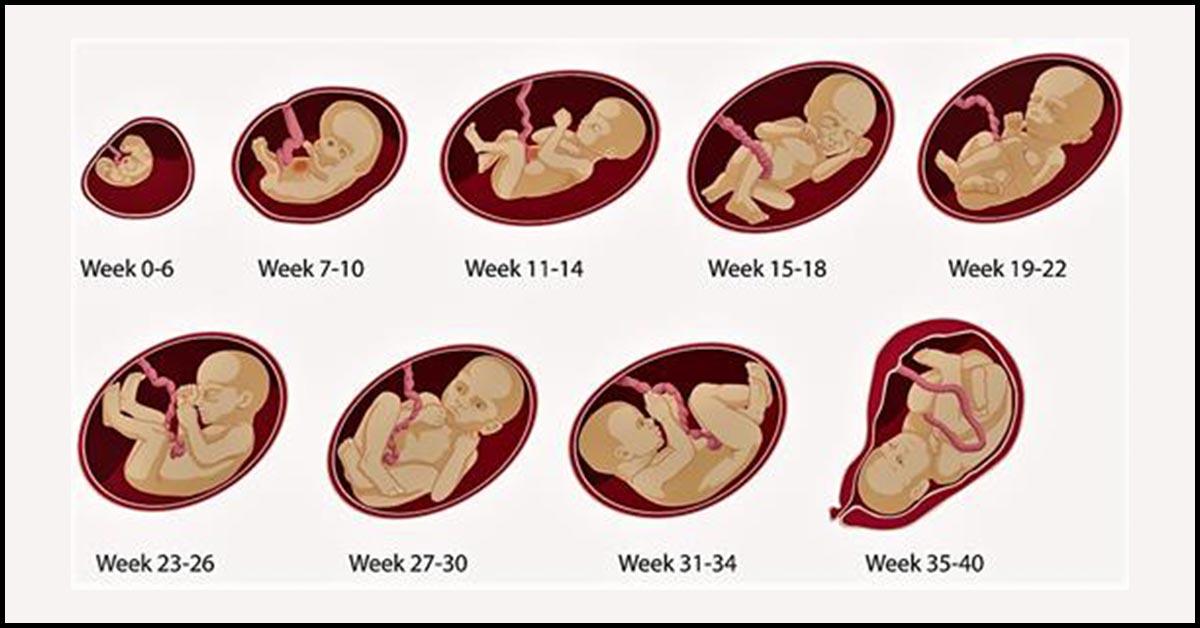 Source: bing.com
Source: bing.comPregnancy is an amazing journey for women, and it’s even more amazing to think about the baby developing inside you. It’s important to understand baby development throughout pregnancy week by week so that you can prepare for the arrival of your little bundle of joy. In this article, we’ll be discussing all the exciting changes that occur in your baby’s development from week 1 to week 40.
Table of Contents
Week 1 – 4
During the first few weeks of pregnancy, your baby is just a tiny ball of cells, known as a blastocyst. At this stage, the blastocyst is busy dividing into two groups of cells – one group will form the embryo, while the other will form the placenta. By the end of week 4, the heart will start to beat and the neural tube will form, which will eventually develop into the brain and spinal cord.
Week 5 – 8
As your baby enters the embryonic period (weeks 5-10), the organs begin to form. By week 8, your baby’s arms, legs, and fingers will start to grow, and the face will take shape. The placenta also takes on a more important role, providing essential nutrients and oxygen to your growing baby.
Week 9 – 12
By week 10, your baby is now called a fetus. The fingers and toes have separated, and the eyelids are starting to form. The digestive system is also developing, and your baby will start to swallow and excrete amniotic fluid. By the end of week 12, your baby’s reproductive organs will be fully developed, and you may even be able to determine the gender through ultrasound.
Week 13 – 16
During the second trimester (weeks 13-27), your baby’s growth will accelerate. By week 16, your baby will be the size of an avocado, and you may start to feel the first flutterings of movement. The bones will start to harden, and the nervous system will become more complex.
Week 17 – 20
By week 20, your baby is halfway through the pregnancy. The skin will start to thicken, and hair will grow on the scalp. Your baby’s senses will begin to develop, and they’ll be able to hear sounds outside the womb. This is also the time when you’ll have your anatomy scan, which checks for any abnormalities in your baby’s development.
Week 21 – 24
By week 24, your baby’s lungs are starting to develop, and they’ll start practicing breathing movements. The eyes will be fully formed, and your baby will start to blink. They’ll also be able to taste the amniotic fluid they’re swallowing, which is influenced by the foods you eat.
Week 25 – 28
During the third trimester (weeks 28-40), your baby’s growth will slow down slightly as they prepare for delivery. By week 28, your baby’s brain is developing rapidly, and they’ll start to dream. They’ll also be able to open and close their eyes and kick with more force as they get stronger.
Week 29 – 32
By week 32, your baby is getting cramped inside the womb, but their movements will still be frequent. The fat under the skin will start to accumulate, and their skin will take on a more opaque appearance. They’ll also be practicing sucking and swallowing, which will come in handy for breastfeeding.
Week 33 – 36
As your due date approaches, your baby will start to prepare for delivery. By week 36, almost all babies will be in the head-down position, ready for birth. The lungs will continue to mature, and the digestive system will start to work more efficiently.
Week 37 – 40
At 37 weeks, your baby is considered full-term and ready for delivery. They may weigh anywhere between 5-10 pounds, and their organs will be fully formed. The bones in the skull will remain soft to help with delivery, and the baby will be covered in a white, waxy substance called vernix caseosa.
Frequently Asked Questions
Q: What is the average length of pregnancy?
A: The average length of pregnancy is 40 weeks, or 280 days, from the first day of your last menstrual period.
Q: How often should I go for prenatal check-ups?
A: During a typical pregnancy, you’ll have around 14 prenatal check-ups. These check-ups are usually scheduled every 4-6 weeks during the first two trimesters, and every 2-3 weeks during the third trimester.
Q: How can I tell if my baby is healthy during pregnancy?
A: Regular prenatal check-ups, ultrasounds, and blood tests can help to detect any potential issues with your baby’s development. You should also pay attention to your baby’s movements – if you notice a decrease in movement, contact your healthcare provider immediately.
Q: What can I do to support my baby’s development during pregnancy?
A: Eating a healthy, balanced diet, getting adequate rest, and avoiding alcohol, tobacco, and other harmful substances can all help to support your baby’s development during pregnancy. You can also talk to your healthcare provider about prenatal vitamins and any other supplements you may need.
Q: What should I expect during labor and delivery?
A: Labor and delivery can be an unpredictable and intense experience, but it’s important to remember that every woman’s experience is different. You can work with your healthcare provider to create a birth plan that outlines your preferences for pain management, delivery position, and other aspects of your birth experience.
In conclusion, understanding baby development in pregnancy week by week can help you prepare for the arrival of your little one. From the blastocyst to the fully-formed fetus, every stage of development is exciting and miraculous. By taking care of yourself and your baby during pregnancy, you’ll be setting the stage for a healthy and happy life together.
